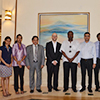A regional training workshop on ‘Enhancing Capacities for Trade in Services Policymaking and Negotiations’ was held in Colombo recently, with the aim of creating awareness among the stakeholders understanding on the collection and use of services trade statistics, institutional mechanisms for services-related decision-making and improving competitiveness in the services sector.
A regional training workshop on ‘Enhancing Capacities for Trade in Services Policymaking and Negotiations’ was held in Colombo recently, with the aim of creating awareness among the stakeholders understanding on the collection and use of services trade statistics, institutional mechanisms for services-related decision-making and improving competitiveness in the services sector.
The four-day workshop was supported by the UK-funded Trade Advocacy Fund (TAF) and jointly delivered as an initiative of the International Lawyers and Economists Against Poverty (ILEAP), CUTS International Geneva and the Centre for the Analysis of Regional Integration at Sussex (CARIS), alongside the Institute of Policy Studies of Sri Lanka (IPS).
In his opening remarks, ILEAP Executive Director David Primack recalled, “Services trade plays a central role in promoting sustainable development, supporting inclusive economic growth and reducing poverty in modern economies.”
He highlighted further that a number of key challenges prevented developing countries like Sri Lanka and others in the SAARC region, from undertaking needed reforms in the services sector. Such challenges include the lack of available and reliable services trade data on which to base analysis and decision-making, low level of skills available for interpreting the data that is available, absence of effective institutional mechanisms for supporting interaction between relevant stakeholders engaged in services policymaking and negotiations and limited understanding of the pathways through which services competitiveness can be enhanced.
The training initiative is a cornerstone in the implementation of a project aimed at contributing to the increased and more effective participation of least developed countries (LDCs), low-income countries (LICs) and lower-middle income countries (LMICs) and their associated regional economic community (RECS), in multilateral, regional and bilateral services trade negotiations.
The participants at the intensive training workshop included services negotiators, policymakers and other non-state actors from the private sector and civil society within the SAARC region – representing India, Bangladesh, Nepal and Sri Lanka.
